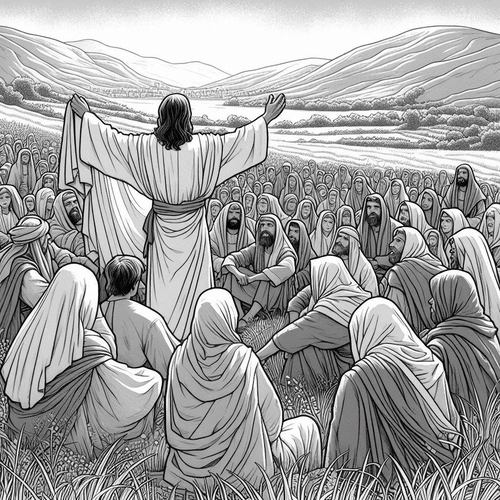Affirm the Virgin Birth? Why Must We?
Why affirm the virgin birth? To many modern secular individuals, the concept of a virgin birth may seem like an ancient myth from pre-scientific times. How could a rational person believe Mary miraculously conceived Jesus while she was still a virgin? However, the truth of the virgin birth is affirmed by the Gospel writers. It is also critical to foundational Christian doctrine. Let’s explore why the virgin birth is significant.
First Things First: Does A Miracle-Working God Exist?
Some people say a virgin birth can’t happen because it’s impossible in nature. But this misses the point. If God exists and created everything, He can certainly do things that seem impossible to us. Just as programmers can override their code’s normal operations, or authors can write exceptions into their story’s rules, God would certainly be capable of transcending natural law.
So the big question isn’t ‘Can a virgin give birth?’ but rather ‘Is there a God who can make this happen?’ (DO CHECK OUT OUR POST: Does God Exist? 10 Compelling Evidences)
Prophetic Fulfilment
The virgin birth did not occur randomly; it fulfilled specific Hebrew prophecies. One of the most famous prophecies is found in Isaiah 7:14: “Therefore the Lord himself will give you a sign: The virgin will conceive and give birth to a son, and will call him Immanuel.” Written centuries before Christ, this prophecy foretells the birth of the coming Messiah would be no every-day event—but rather, the first and last time a virgin would deliver a baby. What’s more, elsewhere in Scripture (Micah 5:2), we’re told with pinpoint precision—and centuries before its fulfilment—where this extraordinary event was to occur: in Bethlehem, which was then an insignificant village. Matthew’s gospel directly quotes these texts, emphasizing how the miraculous event fulfilled these messianic prophecies.
Eyewitness Testimony
The accounts of the virgin birth come from apostolic eyewitness testimonies, primarily recorded by Matthew and Luke. While their exact details may differ—Matthew traces the genealogy of Jesus from Joseph’s side, while Luke narrates Mary’s—both authors agree on the virgin birth. The fact that two independent sources corroborate this extraordinary event lends significant weight to its authenticity.
Theological Necessity
The Apostle Paul’s writings do not directly allude to the virgin birth, but indirectly affirm it. Consider how: he establishes Jesus’ pre-existent spiritual form (Philippians 2:5-8), and His dual nature as fully God and fully human (Galatians 4:4). Only through the virgin birth could Jesus be fully human without inheriting a sin nature; this qualified Him to be the perfect sacrifice for humanity’s sins.
A Sinless Sacrifice
The virgin birth was essential for Jesus to be the blameless, sinless sacrifice to atone for humanity’s sins. Had He been born through normal human conception, He would have inherited the same sin nature He came to redeem mankind from. Only by being supernaturally conceived in Mary’s womb through the Holy Spirit could Jesus take on true humanity while remaining unstained by the innate sins passed down from Adam. The virgin birth was critical for Jesus to be the unblemished “lamb of God,” the perfect, spotless offering for our sin.
Affirmation of Jesus’ Claims
Most pivotally, the doctrine of the virgin birth validates who Jesus Himself claimed to be. Throughout the Gospels, Jesus clearly asserted His divinity as the eternal One, and as the Son of God who miraculously took on human form. If His birth were not of a virgin, it would imply He fabricated His identity, and undermine our trust in His words. Accounts of His miracles would become mere folktales, and His sacrifice would be rendered meaningless.
Addressing Alternative Theories
Naturalistic explanations for the virgin birth face serious challenges. The theory that Jesus was an illegitimate child is unconvincing. It would require believing Mary and Joseph engaged in deception, which contradicts their portrayed character and ethics.
Conclusion
The virgin birth, then, is more than a historical detail; it’s a core tenet of our faith and has profound theological implications. It affirms Jesus’ unique identity as both God and human, the sinless sacrifice for humanity’s redemption.
Why Affirm the Virgin Birth—Related FAQs
Why would God choose such an unusual method for Jesus’ birth? The virgin birth marked Jesus as unique from the very beginning—someone who didn’t come into the world through ordinary means. It fulfilled Old Testament prophecy (Isaiah 7:14) and demonstrated God’s supernatural power. Most importantly, it established Jesus as both fully human (born of Mary) and uniquely divine (conceived by the Holy Spirit) from the moment of conception.
Weren’t virgin birth stories common in ancient mythology? Isn’t this just another myth? While supernatural birth stories appear in some ancient myths, the biblical account is strikingly different. Ancient myths typically involved physical relations between gods and humans, while the Gospel accounts emphasize a miraculous but non-physical conception through the Holy Spirit. The historical context, the humble circumstances, and the matter-of-fact way it’s recorded set it apart from mythological tales.
Why do only two Gospels (Matthew and Luke) mention the virgin birth?Not every Gospel needed to record every detail of Jesus’ life—each writer chose events that served their specific purpose and audience. Matthew and Luke focus more on Jesus’ birth narrative, while Mark starts with Jesus’ adult ministry and John begins with a theological declaration about Jesus’ eternal existence. The fact that two independent sources record the virgin birth, with different but complementary details, actually strengthens its historical credibility.
If the virgin birth is true, why was it so poorly documented at the time?The virgin birth, by its very nature, would only have been known to a small circle of people initially—primarily Mary, Joseph, and perhaps their closest confidants. Given the private nature of such an event and the skepticism it would have faced, it makes perfect sense that it wasn’t widely documented at the time. The fact that both Mary and Joseph initially struggled with accepting—this miracle (as recorded in the Gospels) actually adds to its credibility it shows the account wasn’t crafted to be easily believable.
Wouldn’t Mary and Joseph have told more people if this really happened? Why keep such a miracle quiet? Their careful discretion actually makes perfect historical sense. In first-century Jewish culture, claiming a virgin birth would have exposed Mary to severe social consequences and potential legal punishment. Joseph’s initial plan to “divorce her quietly” shows the serious cultural stakes involved. Additionally, who would have believed such an extraordinary claim without proof? Even today, parents of miracle babies often keep their stories private at first, sharing them more widely only when the time is right. The fact that this account eventually became public through the Gospels, when Mary was still alive to confirm or deny it, adds to its credibility.
Related Reads:
Editor's Pick

‘Flee Sexual Sin’: Why Does Paul Single This Sin Out?
When the apostle Paul writes to the Corinthian church, he doesn’t tell them to simply avoid sexual immorality or resist [...]

Does Denying God’s Sovereignty Mean Denying the Gospel?
RC Sproul once warned denying God’s sovereignty “eviscerates” grace—a strong word meaning to gut or disembowel something, leaving only an [...]

Why Christians Fast: The Biblical Discipline’s Very Real Rewards
Why would Christians, who rejoice in the good gifts of food and fellowship, deliberately choose to go without? Isn’t fasting [...]

The Christian Sabbath: Why Did Sunday Replace Saturday?
Consider this: God-fearing Jews who’d faithfully observed Saturday Sabbath for over a thousand years suddenly began gathering for worship on [...]

Did the Early Christians Worship Jesus? The Biblical Evidence
It was a startling transformation: Jewish fishermen who'd spent three years following this itinerant carpenter from Nazareth now begin to [...]

If Jesus is Messiah, Why Aren’t ALL Messianic Prophecies Fulfilled?
If Jesus is truly the Messiah, why hasn't world peace arrived? Why do Jews still face persecution? Why isn't the [...]

When Courage Fails: Will I Be Forgiven If I Deny Christ in Persecution?
The rooster crowed, and Peter remembered. In that devastating moment, the apostle realised he’d just done the unthinkable—three times he’d [...]

What Makes a Godly Dad? 5 Biblical Principles Fathers Need
Modern culture sends fathers mixed messages. Be strong but sensitive. Be involved but not overbearing. Lead but don’t dominate. With [...]

What Makes a Godly Mom? A Scripture-Backed Guide
In our culture’s confusion about gender roles and parenting, the timeless question remains: what makes a godly mother? While secular [...]

Paul’s Mandate for Men: Headship Or Servant Leadership? Or Both?
Modern Christianity has fallen into a trap. We've created an either/or battle between "headship" and "servant leadership," as if these [...]
SUPPORT US:
Feel the Holy Spirit's gentle nudge to partner with us?
Donate Online:
Account Name: TRUTHS TO DIE FOR FOUNDATION
Account Number: 10243565459
Bank IFSC: IDFB0043391
Bank Name: IDFC FIRST BANK






